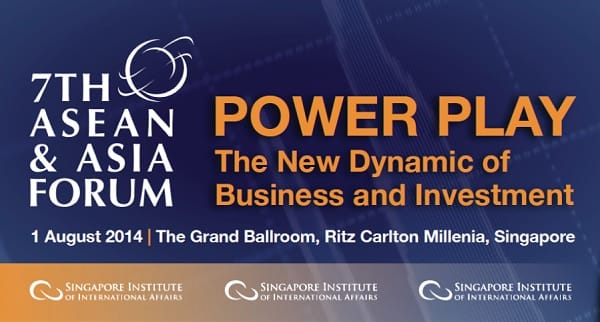2On 1 August 2014, the Singapore Institute of International Affairs held the seventh installment of our annual ASEAN and Asia Forum(AAF). The conference aims to promote awareness about ASEAN and international affairs, building upon the institute’s connections to both the public and private sector to create an avenue for meaningful dialogue.
This year’s conference was centered around the theme “Power Play: The New Dynamic of Business and Investment”, and through the robust panel discussions that took place, it is clear that while ASEAN cannot overlook the potential impacts of tensions that occur in the wider Asian region, it must remain neutral. Power shifts in Asia will influence the future of business and commerce; ASEAN will have to tread carefully in managing its relations with China and Japan, particularly with the ongoing rivalry between the two Asian powers. The private sector needs to understand the interaction between geopolitics and commerce, as the impacts are “bound to trickle down to where investments are made”, as mentioned by SIIA Chairman Prof. Simon Tay, during his interview with Channel NewsAsia.
As ASEAN moves into a period of greater integration, it also has to work together to aid in the growth of its individual players – Myanmar, the 2014 ASEAN Chair, is an example of this. As mentioned in an article published by the Channel NewsAsia, Singapore could assist in the development of other ASEAN nations by “sharing its technologies and expertise”.
— ASEAN and Myanmar’s role [Channel NewsAsia, 1 Aug 2014] [Video]
Greater coverage of the conference and its discussions can be found on TODAY as well as Channel NewsAsia. Excerpts of the forum will also be broadcast on Channel NewsAsia as a special programme titled “7th ASEAN and Asia Forum: Power Play in ASEAN” on Monday, 18 August 2014 at 8.30pm.
“The Myanmar government accepts that constitutional reforms in the country need to be seen through, but reforms have to follow appropriate procedures and the process cannot be rushed,” said the Coordinating Minister for Economic Development U Soe Thane.
He was refering to moves by the opposition National League for Democracy (NLD) party, led by Ms Aung San Suu Kyi, to lobby for constitutional amendments that will allow Ms Suu Kyi to contest next year’s presidential election.
— Constitutional reforms must go through parliament: Myanmar minister [TODAY, 1 Aug 2014]
“We accept that the Constitution should be amended … You can amend it according to the procedure,” said Mr U Soe Thane, referring to the requirement that constitutional amendments have to go through Parliament.
The NLD has ramped up its efforts to campaign for public support to amend Article 436. Two weeks ago, it said it had received five million signatures backing the move, but it is unclear how much sway the campaign holds with the country’s Parliament.”
— Constitutional reforms in Myanmar ‘cannot be rushed’ [TODAY, 4 Aug 2014]
SIIA Chairman Simon Tay says the business community is still trying to grapple with the issues beneath the tensions. “Whether it’s the South China Sea or the problems in Northeast Asia between the Chinese and the Japanese, it seems like noise and rumbling from offstage, but I think the bigger position to realise is that it can have an impact. If there is a violent conflict or a sense of disunity in ASEAN, this can really start to affect how the integration of ASEAN happens and the speed (at which it happens). I frankly think we’re at the beginning of trying to understand it,” Professor Tay said.
— Singapore can advise developing ASEAN countries by sharing expertise: Burmese Minister [Channel NewsAsia, 1 Aug 2014] [Video]




